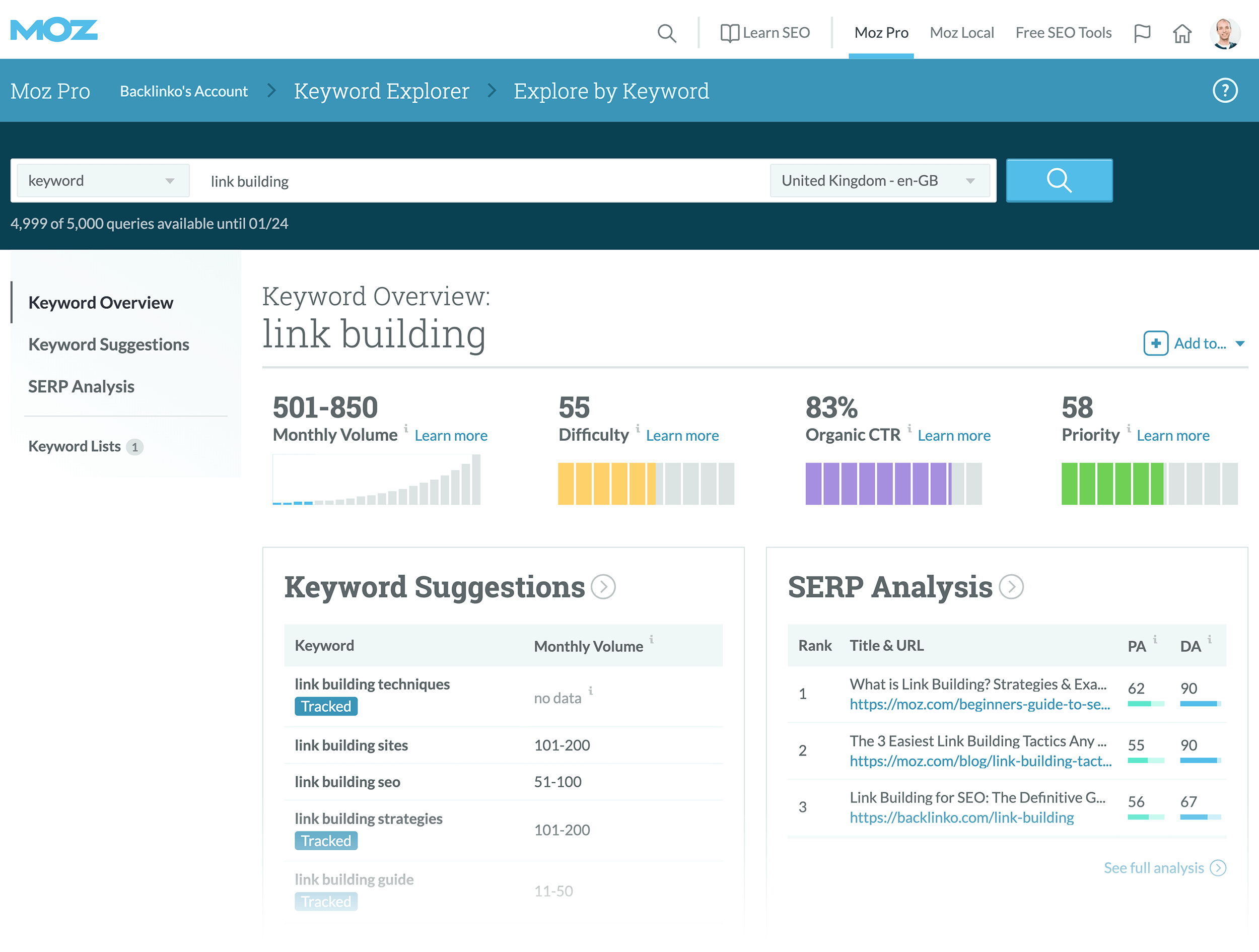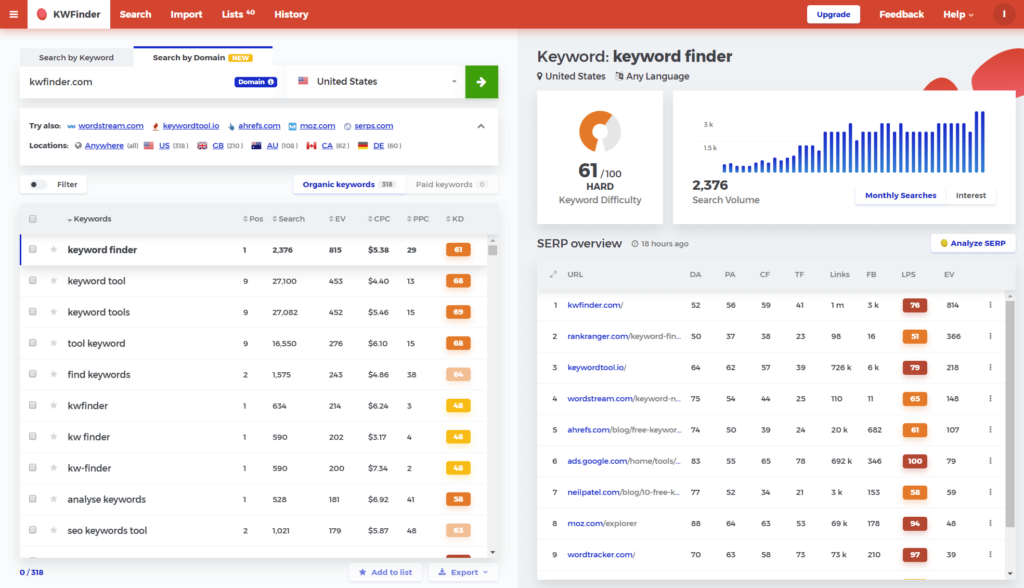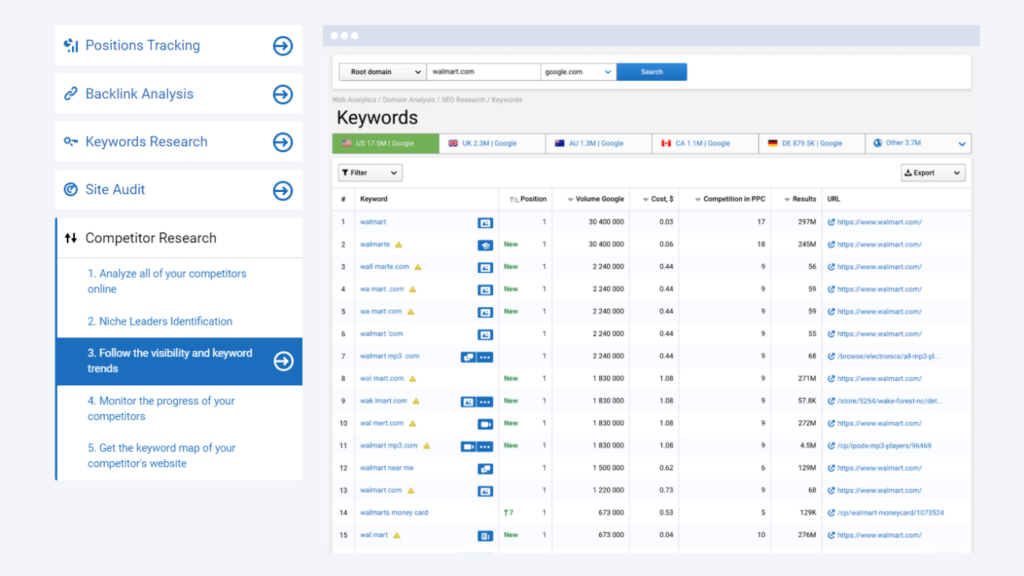Google’s algorithm uses over 200 factors when ranking websites - so optimizing your website’s content according to these factors is crucial. This algorithm is always changing, so using SEO software will ensure your business is at the top of relevant keyword searches. Being at the top of these searches means that your business will have high-targeted people coming to your website and buying your products or services. This is the dream!
Mastering SEO can be challenging, but the list of SEO tools I put together will help simplify this for your business so you can quickly reap the benefits. Finding the best SEO software will be easy after reading through this list. Trying out all these platforms isn’t necessary; you just need to identify which works best for your needs.
The Best SEO Tools Shortlist
Here are the top 10 seo tools I’d like to highlight out of the 27 I cover in this article:
- Ahrefs - Best for backlink research
- SEMRush - Best for identifying search engine opportunities
- Moz Pro - Best for increasing search engine visibility
- Mangools KWFinder - Best for finding long tail keywords with low SEO difficulty
- Serpstat - Best all-in-one SEO platform
- SEO Spider - Best for technical website audits
- SE Ranking - Best for rank tracking
- ContentKing - Best for change tracking
- BuzzStream - Best for outreach campaigns
- SpyFu - Best for competitors research
Indie Media Club is reader-supported. We may earn a commission when you click through links on our site — learn more about how we aim to stay transparent.
How I Selected the Best SEO Software
Perhaps you're wondering how I selected the best SEO software for this list? To build this top 10 list, I evaluated and compared a wide range of SEO software with positive user ratings.
After determining my long list of top choices, I further honed my list by using the selection criteria below to see how each platform stacked up against the next one. I also drew on my years of marketing experience to pinpoint the features that add a lot of value.
If you have general questions about SEO software or how to pick the best SEO software for your organization, take a look at our frequently asked questions section below. Or, you can skip directly to my detailed software summaries, if that's what you need the most.
Selection Criteria
Here’s a short summary of the main selection and evaluation criteria I used to develop my list of the best SEO software for this article:
User Interface (UI):
The best SEO software must have an interface with an excellent design. I look for a UI that shows users the most important SEO metrics they need to make good optimization decisions. It should have a simple navigation that allows you to find the features you need to operate the platform efficiently.
Usability:
SEO can be challenging for businesses, and it’s more complex if you have to try to figure out how your SEO software works. I look for tools that don’t require users to have much SEO experience. Some of the best platforms will have basic tutorials to help you orient yourself with the software.
Value-adds:
Some SEO software vendors offer features that are difficult to find in other tools. So, I look for value-adds that provide benefits that make the SEO tool stand out from the rest. For example, you might need Google to re-crawl your site after your team makes a significant update or fixed errors. So, a platform that requests new crawls from Google will be worthwhile for any business.
Software Integrations:
You shouldn’t expect to use SEO software on its own. The platform you choose should integrate and share data with the systems you’re already using. This is especially crucial when content creation and conversion tracking are vital functions of your marketing plan. I look for SEO tools with web tracking, Webmaster, and paid advertising tools.
Pricing:
The price of SEO software isn’t everything - but it makes a significant difference if you’re running a small business. When making this list, I look for tools that offer users sufficient value and functionality to make it worth the final price. I also looked for other pricing factors, such as trial length, subscription commitment, and the options available for businesses with different requirements.
Overviews of the 10 Best SEO Software
Here’s a brief description of eachSEO software to showcase each one's best use case, some noteworthy features, screenshots, and pricing information.
1. Ahrefs - Best for backlink research
Ahrefs offers companies tools to help them easily monitor their websites for backlinks and create a link-building campaign.
Why I picked Ahrefs: With billions of indexed pages and trillions of backlinks, Ahrefs has the most robust backlink index. This can help your company improve website traffic and its backlink auditing capabilities. You can use the platform extracts data to help with link building, keyword research, rank tracking, SEO strategies, and content marketing.
Ahrefs can help freelancers, self-employed businesses, and enterprises of any size snipe their competitors’ backlinks, identify broken link opportunities, and monitor their link acquisition. The platform has tools to help you see what people are searching for on Google, allowing you to determine the potential traffic you can get from creating content about a topic. Afrefs’ tools can also help you discover how difficult it is to rank for any keyword, which will help you see whether attempting to rank for a keyword is worthwhile.
Ahrefs Standout Features and Integrations
Features include SEO, keyword tracking, data visualization, link tracking, notifications, data import and export, and analytics.
Integrations include Reportz, Amazon, Desktop.com, Marketing Miner, GuinRank, Rambox, Google Search Console, AgencyAnalytics, DashThis, Rank Ranger, Klipfolio, and Databox.
Ahrefs costs from $99/month when paying monthly or $83/month when paying yearly.
Pros
- It helps users create effective lead-generation strategies.
- The dashboards and interface are easy to understand for new users.
- It crawls the web 24/7, collecting, analyzing, and displaying backlink data.
Cons
- The platform has additional features that users have to pay to use.
- It doesn’t provide local SEO information.
2. SEMRush - Best for identifying search engine opportunities
SEMrush provides comprehensive tools to help businesses identify search engine opportunities.
Why I picked SEMrush: The platform helps many website owners and entrepreneurs understand what SEO strategy will help them rank on search engines. It provides excellent metrics and lets you know how to get top-performing content, pages, and keywords. These capabilities make SEMrush one of the most popular tools for businesses.
SEMrush helps small and medium-sized organizations get tools for SEO, pay-per-click (PPC), keyword research, and backlinks. The traffic analytics feature gives you accurate details regarding your site’s online performance. It gives you in-depth information about your potential customers’ behavior and media consumption.
SEMrush Standout Features and Integrations
Features include data visualization, link tracking, marketing automation, conversion tracking, customer management, SEO, project management, analytics, and audience targeting.
Integrations include Zoho Analytics, monday.com, Whatagraph, Swydo, databox, AgencyAnalytics, Surfer, Respona, Yoast, Writesonic, Wix, and AIOSEO.
Price: SEMrush costs from $119.95/month when paying month-to-month or $99.95/month when paying annually. The vendor also offers a free subscription that’s limited in the amount of data you can pull each month.
SEMrush offers a free 7-day trial for new users.
Pros
- The topic research tool helps users create new content strategies.
- It provides accurate SEO score information when auditing websites.
- Users can see their competitor’s Google search ads.
Cons
- The price can be high for some businesses.
- The UI can be difficult to navigate for new users.
3. Moz Pro - Best for increasing search engine visibility
Moz Pro provides tools to help businesses increase their search engine exposure.
Why I picked Moz Pro: The platform’s tool will guide you through increasing your search engine visibility. Moz Pro enables you to audit your website for potential issues, highlight them, and make the necessary improvements from the software’s recommendations. This process includes identifying low-competition keywords, exploring and building backlinks, and enhancing on-page SEO.
Moz Pros allows organizations of any size to ensure they get the maximum potential to rank for their target keywords. The automation capabilities within the program can help you focus on crucial business aspects, and you can read the software’s reports when you have the time. The reports are easy to read, so you can improve your SEO strategy immediately.
Moz Pro Standout Features and Integrations
Features include keyword tracking, data visualization, link tracking, notifications, multi-users, data import and export, and an API.
Integrations include Google Analytics 360, Rippling, Klipfolio, Databox, AgencyAnalytics, TapClicks, WebCEO, Cyfe, ReportGarden, Pitchbox, BrightEdge, and LinkTrust.
Moz Pro costs from $99/month when paying monthly or $79/month after signing up for yearly billing. Moz Pro offers new users a 30-day free trial.
Pros
- The platform’s metric makes it easy to analyze backlinks.
- The bot crawls websites and creates reports quickly.
- Users can see trends in keyword rankings.
Cons
- The navigation can use some work to be more user-friendly.
- Sometimes the platform requires browser features that are often disabled.
4. Mangools KWFinder - Best for finding long tail keywords with low SEO difficulty
KWFinder enables you to research long-tail keywords that can help your website rank in the long term.
Why I picked KWFinder: The platform can help you rank for broad search engine keywords that are related to your business. Long tail keywords are easier to rank for and have the potential to bring in more traffic to your website - and KWFinder can help you find these keywords without all the bells and whistles you would find in other software. You can use the data that KWFinder provides to analyze the competition’s strategies and find opportunities to help you develop your strategy.
KWFinder can help businesses of all sizes analyze backlinks and SERPs. The rank tracking tool helps determine where they rank while tracking their progress. If you’re looking to bring in more local traffic, KWFinder’s local keyword research tool can help discover what people are looking for in your local area. You can use this information to help you appeal to the local market for more niche traffic.
KWFinder Standout Features and Integrations
Features include [PING EDITOR] keyword look-up, bulk upload and review, domain look-up, list creation, data aggregation, and competition analysis.
Integrations include Desktop.com and Google. You can also connect through KWFinder’s API to unlock more integrations.
KWFinder costs from $49/month when paying month-to-month or $29.90/month when paying annually.
Pros
- It’s easy to use with no learning curve.
- The software is affordable for any business.
- It has a clean and straightforward user interface.
Cons
- Users can’t bulk calculate keyword difficulty automatically; they must click each keyword.
- It sometimes gives incorrect data when analyzing niche words.
5. Serpstat - Best all-in-one SEO platform
Serpstat helps organizations enhance their website’s overall SEO performance.
Why I picked Serpstat: It’s a one-stop shop for SEO and digital marketing tools. You can use it to optimize your SEO and run your content marketing and advertising campaigns. The information it provides can help you know how your site ranks on search engines.
Serpstat is an excellent choice for self-employed business owners and small, medium, and large enterprises solve SEO tasks, analyze their competition, and manage their marketing teams. The Missing Keyword tool can help you identify the keywords that the competition is ranking for on the top 10 search engine results and you aren’t. You can use the platform to view your traffic share compared to the competition for tracked keywords to see where you stand in the competitive landscape.
Serpstat Standout Features and Integrations
Features include keyword tracking, data visualization, link tracking, marketing automation, brand management, analytics, API, and data import and export.
Integrations include Gmail, Google Data Studio, Reportz, Oviond, Datorama, Key Collector, Netpeak Checker, SEOTools for Excel, Google Sheets, Shift, Conductor, and Stackby.
Serpstat costs from $69/month when paid monthly or $55/month when signing up for an annual contract. Serpstat offers a 7-day free trial for new users.
Pros
- The platform is easy for new users.
- The vendors provide excellent customer support.
- It has uncommon, advanced features, such as text analysis.
Cons
- Its small database can lead to some unusual discrepancies.
- The navigation can use some improvement to reduce the number of steps to perform a task.
6. SEO Spider - Best for technical website audits
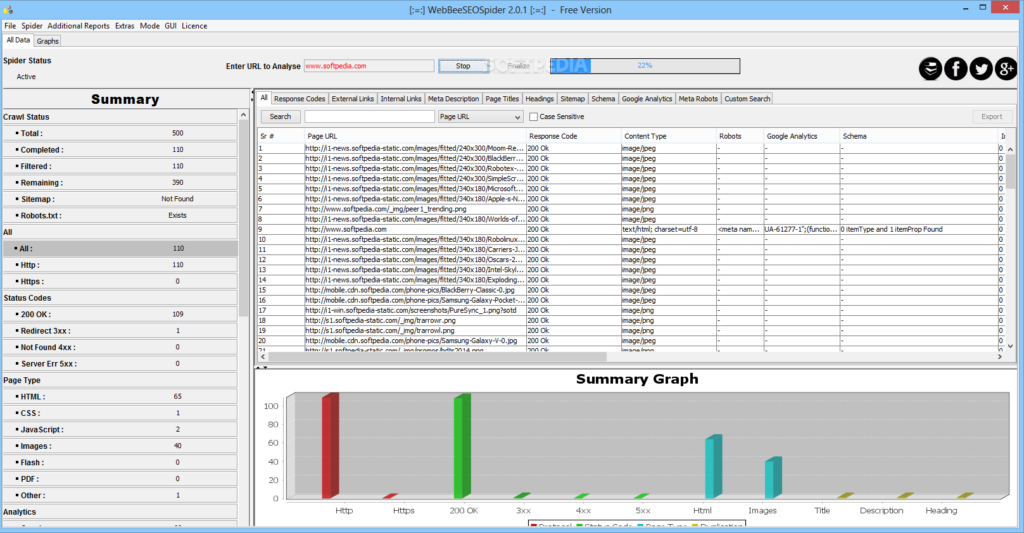
SEO Spider crawls websites and examines the URLs for common SEO issues.
Why I picked SEO Spider: You can use the software to crawl various aspects of your website, such as its links, CSS, images, apps, and scripts. It can gather vital on-page SEO elements and present them in tabs by type, which allows you to filter for common issues or analyze the data as you see fit. It’s strictly a technical auditing software that helps you simplify and expedite a normally time-consuming process - especially if you’re operating a large website.
SEO Spider is an excellent choice for small and medium-sized businesses - freelancers can also use it when auditing their clients’ websites for technical issues. After crawling a website, it creates a spreadsheet of all the site’s pages and SEO elements. You can use this information to optimize your website after identifying the site’s meta descriptions, broken links, and other vital aspects that can affect your search ranking.
SEO Spider Standout Features and Integrations
Features include data import and export, external integrations, keyword tracking, and link tracking.
Integrations include Google Analytics, Ubuntu, Google Sheets, Google Search Console, Google PageSpeed Insights, and Chromium OS.
SEO Spider costs from $209/year. SEO Spider offers a free license, but there’s a limit to its features.
Pros
- The software lays out all the information you need.
- Users can analyze multiple on-page parameters in one platform.
- It can crawl websites really fast.
Cons
- The user interface is outdated.
- It can take up a lot of space on a computer.
7. SE Ranking - Best for rank tracking
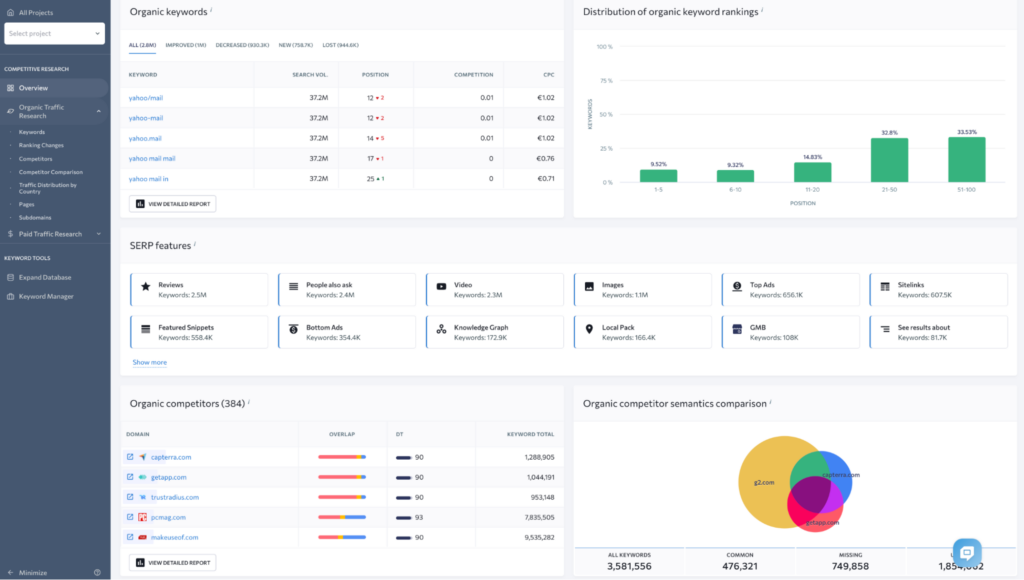
SE Ranking allows users to monitor their website’s keyword position in search engines and evaluate their SEO potential.
Why I picked SE Ranking: The platform will help you track your overall search engine ranking progress to let you know how close you are to reach your goals with a percentage marker. You can track your chosen keywords in major search engines, including your local and mobile ranking. SE Ranking also lets you peek into your competition’s rankings.
SE Ranking is a reliable assistant for marketing and SEO experts in companies of any size, including freelancers. You can also use the platform to check off all the items from your to-do list when working towards your goal. These items are grouped into various categories: keyword research, pre-launch, on and off-page optimization, and social media management.
SE Ranking Standout Features and Integrations
Features include keyword tracking, data import and export, link tracking, dashboard, notifications, and social media integration.
Integrations include Google Analytics, Bitrix24, Wufoo, Shift, Stackreaction, Oviond, and you can also connect through Zapier to unlock more integrations.
SE Ranking costs from $49/month when the platform checks your rankings every day and goes up from there.
Pros
- Track keyword rankings in bulk within minutes.
- It provides a marketing to-do list to help users implement a ranking strategy.
- The platform has an excellent customer support team.
Cons
- It can take time to understand the options available.
- Users can’t monitor specific pages or posts, only the whole website.
8. ContentKing - Best for change tracking

ContentKing is a content tracking tool that can help you follow the history of all your site’s content changes.
Why I picked ContentKing: The software allows you to monitor your website and all its pages 24/7 to identify errors as they happen. ContentKing enables you and your management team to ensure your marketing teams perform changes correctly without missing anything. You can track and identify errors as they happen and take the necessary steps to resolve them before they harm your website and overall business goals.
ContentKing is best for brands that rely on real-time data to help them understand what they’re doing right and where they can improve. It’s also an excellent fit for those who want more visibility into their website’s SEO health. You can use the software’s dashboard to get a visual representation of the tasks to finish on all your domains simultaneously and assign those tasks to the right team member.
ContentKing Standout Features and Integrations
Features include link tracking, data import and export, dashboard, data visualization, analytics, notifications, and SEO.
Integrations include Adobe Analytics, IndexNow, Google Data Studio, Google Search Console, Slack, Microsoft Teams, and Google Analytics.
ContentKing offers custom pricing upon request.
Pros
- It’s easy to use with all the essential data in one place.
- The software provides an overview of your website’s status instantly.
- The vendor provides excellent customer service.
Cons
- It sometimes highlights non-issues.
- The data ContentKing shows can be different from Google Search Console.
9. BuzzStream - Best for outreach campaigns
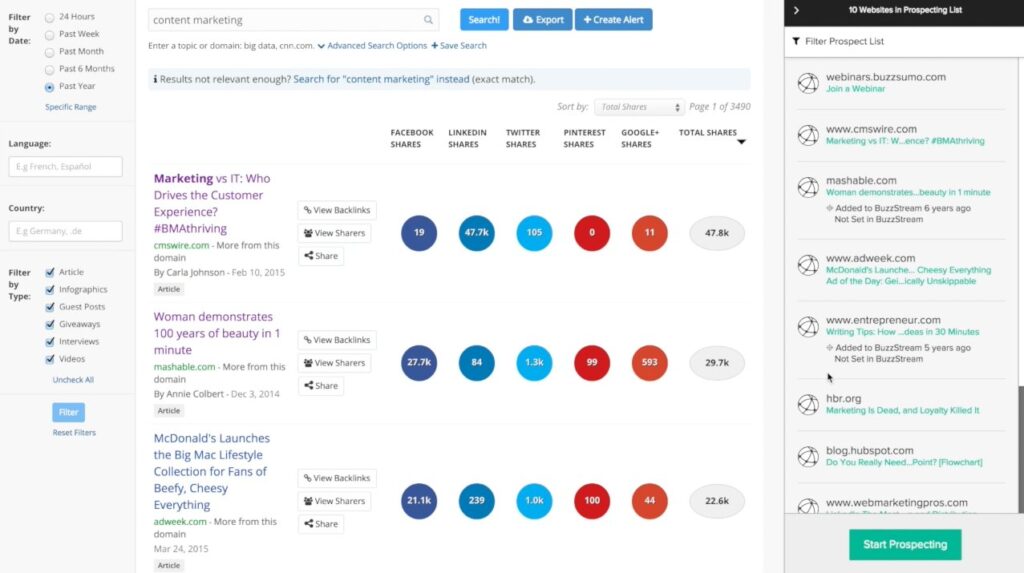
BuzzStream helps organizations conduct outreach campaigns to build backlinks to their sites.
Why I picked BuzzStream: It helps your marketing teams organize and develop relationships with influencers who can place their content in front of the right audience. BuzzFeed makes it easy for you to discover the best people to reach out to, develop effective messages, and track those who accept your request for a link. The right influencer can post a backlink to your website, adding another link-building strategy to your arsenal.
BuzzStream helps businesses of any size, in any industry, find out who’s most likely to be receptive to your link request and whether they’re already part of a campaign. If you don’t know where to find the influencer’s contact details, BuzzStream can do that for you. To save you time trying to figure out what to say, the software has proven templates that will convert.
BuzzStream Standout Features and Integrations
Features include data import and export, contact management, audience targeting, lead management, and notifications.
Integrations include seoClarity, Teamstack, Rambox, Desktop.com, Hunter.io, and Ahrefs. You can also connect through BuzzStream’s API to unlock more integrations.
BuzzStream costs from $24/user/month. BuzzStream offers a 14-day free trial for new users.
Pros
- It provides detailed analytics about outreach efforts.
- The bulk send feature allows users to send as many messages as possible.
- It’s easy to record all of the data users need.
Cons
- Some users experience bugs when using the software.
- It can become slow with heavy usage.
10. SpyFu - Best for competitors research
SpyFu is a competitive intelligence tool that helps users improve their online search rankings.
Why I picked SpyFu: You can use the software to discover the most profitable keywords your competitors are using for their websites. The platform allows you to find how your competitors’ search rankings change with historical data and analyze their backlink efforts to find links they have but your website doesn’t. SpyFu also shows your competition’s online advertising campaigns and their organic searches.
SpyFu is an excellent option for businesses of any size that need software to spy on their competitors. The software allows you to pinpoint the keywords your competition buys for online advertising and identify the words and phrases that provide your site with the most traffic. These features enable you to stay ahead of other businesses in your industry and get more visitors to your business.
SpyFu Standout Features and Integrations
Features include keyword tracking, data visualization, conversion tracking, link tracking, data export, API, and brand management.
Integrations include Google Ads and Desktop.com. SpyFu also has an API that allows users to integrate their data into the user’s systems.
SpyFu costs from $39/month when paying monthly or $33/month when paying annually.
Pros
- It offers a lot of competitive ranking data.
- The menu is easy to use for beginners.
- Users can quickly generate an enormous number of keywords.
Cons
- Some users experience bugs when downloading the data in a CSV file.
- The software limits the number of records you can download in a report.
Other SEO Tools
Below is a list that includes some up and coming tools and some old tools that I'm less familiar with. Each can help you with your SEO metrics and SEO strategy.
- SeoClarity - Combines data, AI insights, and now automates execution.
- Raventools - SEO and SEM tools with comprehensive competitor insights.
- WebCEO - SEO and digital marketing tools for agency-level analysis.
- Similarweb - Website traffic ranking and SEO insights; free SEO tools for 1 user.
- Conductor - Organic content marketing platform with great tools for impact measurement.
- SheerSEO - Online SEO software with an accurate, local rank tracker for Google, Bing, and YouTube.
- SEO Site Checkup - SEO site audit that checks for proper tags, backlink quality, and more.
- SEOptimer - Free website analysis for SEO audits and associated reporting.
- SE Ranking - All-in-one SEO software with country/city/region-level tracking and reporting.
- Keyword Tool - Build an easy and useful keyword list using the system behind Google autocomplete.
- Majestic - Find out the quantity and quality of third-party sites that link back to your website as an authority.
- BrightEdge - Real-time SEO research tools for marketers interested in the entire customer journey.
- Woorank - Website optimization, an SEO score, and actionable SEO insights to grow your site.
- Google Analytics - Free website analytics that can be used for content strategy and marketing.
- Yoast SEO - SEO plugin for WordPress with built-in SEO tips, tricks, and optimizations.
- Google Trends - Watch how Google keywords trends shift across the months or years.
- Google Ads - Monitor PPC spend on Google adwords you want to rank for in the Google ad section at the top of the SERP page.
- Bing Webmaster Tool - Performance data and SEO insights about your website.
Best SEO Audit Tools
Here are some additional SEO audit tools you can check out.
- Screaming Frog SEO Spider - Website crawler for Windows, macOS and Ubuntu for technical SEO site audits.
- GTmetrix - See how your site performs, reveal why it's slow and discover optimization opportunities.
- Oncrawl - Leverage 600+ indicators, advanced data exploration and actionable dashboards to analyze your site.
- Deepcrawl - Technical SEO platform used to detect critical improvements needed on your website.
Best Keyword Research & Planning Tools
Need more keyword research and planning tools? Try these!
- Google Keyword Planner - Keyword Planner will give you suggested bid estimates for each keyword, so you can determine your advertising budget
- Ahrefs Keyword Generator - Find relevant keywords from their database of over 8 billion queries.
- Answer the Public - Tap into autocomplete data from search engines to find phrases & questions people are asking around your keyword
Best Backlink Checking Tools
Try these backlink checking tools to boost your SERP ranking and domain authority.
- LinkMiner - Evaluate the SEO power of your backlinks using well-established metrics such as Citation Flow & Trust Flow.
- OpenLinkProfiler - Analyze the links of any website for free.
- Linkody - Easily manage all your links and domains in one place.
- Ahrefs Site Explorer - In-depth look at the organic search traffic and backlink profile of any website or URL.
Best Technical SEO Tools
- Google Search Console - Use Core Web Vitals report to see how your pages perform based on real world usage data.
- Uptime - Trusted by thousands of websites to monitor downtime, performance, and domain health.
- Google Structured Data Testing Tool - Test to see which Google rich results can be generated by the structured data on your page.
- Google PageSpeed Insights - Get your PageSpeed score and use PageSpeed suggestions to make your website faster through our online tool.
- GTMetrix - See how your site performs, reveal why it's slow and discover optimization opportunities.
- Screaming Frog Log File Analyser - Upload your log files, verify search engine bots, identify crawled URLs and analyze search bot data.
People Also Ask
What is SEO Software?
SEO software helps companies investigate their websites’ ranking potential on search engines. They also identify problems that can impact your site’s search rankings. This allows your business to gain more visibility in the search engine ranking pages (SERPs).
Many organizations utilize a few SEO tools to maintain their visibility in Google’s changing algorithm. This is because these companies use them for several other purposes. The most common SEO tools are software as service (SaaS) solutions that you can use online for a monthly fee.
Marketing professionals use SEO software to identify essential details from their efforts. The tools provide them with advanced keyword research, rank-checking, backlink analysis, and competition, among other crucial features.
What are the 7 types of SEO?
To make it easier for marketing professionals to satisfy Google’s ranking factors and keep customers happy, the SEO industry has different types of SEO. Each one has several SEO rules for marketing teams to follow. These SEO types are not different processes; they’re ways of breaking a complicated process down into smaller processes that are easy to manage. Here are the most important types of SEO and why they’re essential to your search ranking strategy:
- Technical SEO: Auditing and optimizing technical elements of your website to improve its performance on search engines helps Google’s crawlers sort and categorize your pages according to their content and functionality. For example, Google often gives preference to websites that are responsive and have a crawlable structure. Having weak technical SEO can result in Google penalizing your site.
- On-Page SEO: It’s important to remember that while search engines look at websites as a whole, it ranks these sites on a page-level basis. So, it’s crucial to pay attention to how you optimize each and every page on your site. On-page SEO involves optimizing your website’s internal links, title tags, URL, HTML code, images, and other on-page elements that improves users’ experience and rankings.
- Content SEO: An excellent content strategy that produces amazing content will encourage Google to rank your site’s pages. Content SEO is effective when your content is high-quality and you optimize it to rank high in search engines. This SEO type aims to create SEO-friendly content that search engines can understand while meeting your visitors’ requirements.
- Off-Page SEO: While the other SEO types concentrate on your content and website’s structure, off-page SEO focuses on the techniques your marketing team uses to promote your business. Popular websites are likely to rank higher than less popular sites. The most important methods for off-page SEO include getting SEO backlinks from other websites and promoting your brand, so people trust you.
- Local SEO: Thousands of companies need customers to visit their physical locations. SEO for local businesses is essential because your business won’t make any money if you need them to come through your doors. Optimizing your content for search engines will likely help them show your content to potential customers in your local city or region.
- Mobile SEO: 63% of Google’s organic search traffic comes from mobile devices. This indicates that potential customers are moving away from traditional desktop searches and using mobile devices instead. So, it’s a good idea to consider adding mobile SEO to your marketing strategy and capitalize on Google’s mobile-first index to ensure your mobile-friendly site ranks high.
- eCommerce SEO: Millions of potential customers perform queries that Google answers that relate to eCommerce. This type of SEO involves optimizing your online store to rank your site on search engines, increasing your website’s traffic. When focusing on eCommerce SEO, your teams should conduct competitive research, optimize your site’s architecture, and enhance your homepage’s SEO.
What are the Key Features of SEO Software?
Implementing an SEO plan is simple when using the best SEO software. But, determining which software is right for your needs can be difficult. When considering utilizing an SEO tool, you should search for a platform that has some or most of these features:
- Keyword Ranking: This feature helps you understand how well your keywords will perform in search engines. It helps you stop wasting time on non-profitable keywords and suggest the best alternatives. Keyword ranking features should provide information regarding how often people search for your keyword, where your site ranks for your keyword, and how your rankings are moving over time.
- Mobile Optimization: An excellent SEO tool will help you identify how mobile-friendly your site is. This feature will consider how quickly your site loads, whether you’re using technologies that aren’t compatible with mobile web browsers, and how easy it is for customers to accidentally click another link or button on a touchscreen. It will also suggest ways to improve it to rank higher on search engines.
- Backlinking: As you’ve just learned, getting backlinks is essential to off-page SEO. A backlink is a website link that leads from one site to another. The purer the backlink, the higher your content will rank – the backlink checker feature of an SEO tool will monitor your backlink profile.
- Competitive Research: You’ll have an advantage if you’re using software that shows how your website compares to your competition. The datasets this feature gives you will give you in-depth details of why your competitor are succeeding in ranking their content and how their work compares to yours. Your SEO software should also help you discover new competitor material and brands every day.
- Search Engine Submission: Search engines use bots to crawl through your website and determine its ranking. Software that provides this feature will submit your new website for indexing to Google and other search engines.
- Reporting: Visual reports help you see the success of your SEO strategy. These reports typically use graphics to help you quickly absorb the most essential details, such as keyword set ranks, cost-per-click (CPC), and competition stats. Some platforms provide long-term SEO project evaluation, including historical ranking data in your reports.
What do you think of these SEO tools?
When you’re ready to implement new SEO software to help enhance your marketing strategy, you can start by thinking about the type of SEO tool your business needs. Try to determine where you need improvements. Maybe you need to improve your content, your site’s technical health, or the number and quality of the links coming to your site.
But improving one aspect of your website’s SEO won’t be enough. You should consider enhancing all ranking factors to help your website get the most search engine performance. This includes your site’s health, backlinks, content, and local marketing, which means getting the most from comprehensive SEO software.
Also Worth Checking Out:



